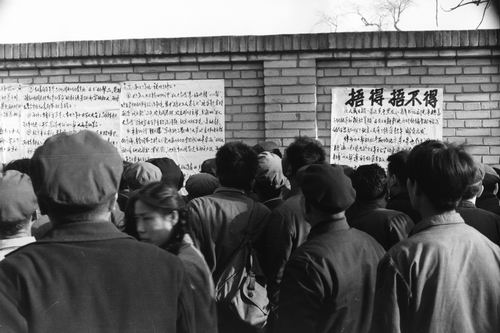<< Read all John Kamm Remembers stories

As American businessman John Kamm was nearing the end of his one-year term as president of the American Chamber of Commerce in Hong Kong, an article appeared in The New York Times about obscure Democracy Wall activist Zhu Jianbin. Before writing the piece, Nicholas Kristof, the paper’s Beijing bureau chief, traveled to Zhu’s hometown of Wuhan.
Kristof wrote: “[Zhu’s] very existence has been virtually obliterated, for most democracy advocates here and abroad have never heard of him, and even in this city where he worked and dreamed of democracy, people shake their heads and say they have never heard his name.”
Reading these words, Kamm resolved to find out what had happened to Zhu Jianbin.
What little was known about Zhu came from media and NGO accounts from the early 1980s. Born in 1957, he was one of more than 100,000 workers employed at Wuhan Steel Works, China’s first supergiant steel factory. He edited a journal about democracy, “The Bell Tolls,” and in the summer of 1980, attempted to form the All-China Association of the Democratic Press. He signed a petition calling for the release of Liu Qing, an editor of the April Fifth Forum. Police detained Zhu in April 1981, then tried and sentenced him to prison for counterrevolutionary crimes.
Kamm didn’t get a chance to ask about Zhu Jianbin until May 1992, after he had met with Politburo Standing Committee Member Li Ruihuan in November 1991 and Vice Minister of Justice Jin Jian in April 1992. Kamm added Zhu’s name to a prisoner list and asked about him in face-to-face meetings with senior officials of the State Council Information Office and the Ministry of Justice. These officials agreed to look into the case.
On his next visit to Beijing, in August 1992, Kamm was received by Prison Administration Bureau Deputy Director Wang Mingdi. Wang told Kamm that Zhu Jianbin was sentenced to six years in prison in 1981, but had his sentence extended for getting into a fight with another inmate. Zhu had recently been released, Kamm was told, and went back to his hometown to resume working. The deputy said Zhu had not been sent to a re-education through labor camp.
Zhu’s case was the first of several Democracy Wall dissidents whose cases Kamm worked on in 1992 and 1993. One by one, the most prominent of them were granted early release: Wang Xizhe in February 1993, Xu Wenli in May 1993, and finally Wei Jingsheng in September 1993.
Listen to the Encounters with China podcast.
Subscribe to receive notifications about new episodes.
Read all John Kamm Remembers stories.
